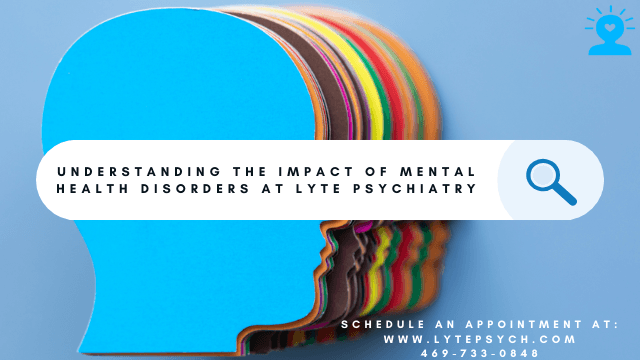Fri May 17 2024
Exploring The Impact of Mental Health Disorders on Daily Life at Lyte Psychiatry (Best Adults and Adolescents Psychiatrist and Therapist Near You), Affordable Therapists and Psychiatrist, Dallas, Fort Worth, TX

Exploring The Impact of Mental Health Disorders on Daily Life at Lyte Psychiatry (Best Adults and Adolescents Psychiatrist and Therapist Near You)
Exploring the impact of mental health disorders on daily life offers valuable insights into how these conditions shape personal experiences, relationships, and overall functionality. Mental health disorders encompass a wide range of issues, including mood disorders like depression and bipolar disorder, anxiety disorders, schizophrenia, and obsessive-compulsive disorders, each presenting unique challenges to those affected.
1. Daily Functioning and Productivity
Mental health disorders can significantly hinder a person's ability to perform daily tasks. For example, depression often leads to fatigue and a lack of motivation, making even simple activities like getting out of bed or personal hygiene challenging. In contrast, someone with anxiety might find decision-making exceedingly stressful, potentially leading to procrastination or avoidance of tasks.
2. Social Interactions and Relationships
The impact on social interactions and relationships is profound. Conditions such as social anxiety disorder can lead to withdrawal from social settings, making it difficult to maintain friendships or professional relationships. Additionally, mood disorders can affect emotional regulation, leading to unpredictable or intense emotional responses that strain relationships.
3. Physical Health
Mental health disorders are also linked to various physical health problems. The stress associated with chronic anxiety can contribute to cardiovascular issues, such as hypertension and heart disease. Likewise, depression has been linked to a weakened immune system, making individuals more susceptible to physical illnesses.
4. Quality of Life
The cumulative effect of these challenges can drastically reduce a person’s quality of life. Living with a mental health disorder often involves managing varying levels of distress, which can overshadow personal achievements and affect one’s sense of well-being and fulfillment.
5. Work and Career
In the workplace, mental health disorders can manifest as decreased productivity, frequent absences, and a higher turnover rate. Employers are increasingly recognizing the need to support mental health in the workplace by providing resources like employee assistance programs and mental health days.
Seeking Professional Help at Lyte Psychiatry (Best Adults and Adolescents Psychiatrist and Therapist)
Understanding the pervasive impact of mental health disorders is crucial for fostering empathy, improving treatments, and supporting affected individuals. Addressing these challenges requires comprehensive strategies that include therapy, medication, and support systems, aiming to improve life quality for those living with mental health disorders.
To Schedule an appointment. Click Here
To see our services. Click Here
Call us if you have questions at 469-733-0848
Frequently Asked Questions (FAQ)
Q: What are the most common signs of a mental health disorder?
A: Common signs include prolonged sadness or irritability, excessive fears or worries, social withdrawal, dramatic changes in eating or sleeping habits, and strong feelings of anger.
Q: How can someone help a loved one who is struggling with a mental health disorder?
A: Start by encouraging them to seek professional help. Be supportive and patient, listen to their experiences without judgment, and offer to help with everyday tasks that they may find overwhelming.
Q: Are mental health disorders treatable?
A: Yes, most mental health disorders are treatable through a combination of therapy, medication, lifestyle changes, and support. Treatment plans should be tailored to the individual, and what works for one person may not work for another. Early intervention often leads to the best outcomes.